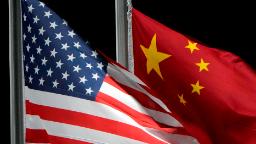
And that was before the apparently tense phone call on Thursday lasting more than two hours, in which Chinese President Xi Jinping warned US President Joe Biden that when it comes to Taiwan, “if you play with fire you get burned.”
It’s not yet clear when Pelosi will visit, or if the trip will occur. She would be the highest-ranking lawmaker to visit since then-House Speaker Newt Gingrich in 1997.
While the US does not officially recognize Taiwan’s government, it does sell defensive weapons to Taiwan — part of a long-standing policy of “strategic ambiguity,” in which the US stays vague on whether it would defend Taiwan in case of a Chinese invasion.
There are warnings about subversion
A ‘watershed’ warning on tech espionage. CNN recently reported on a scuttled plan by the Chinese government to fund an ornate garden at the National Arboretum in Washington, DC, which US officials were concerned could disrupt US nuclear arsenal communications.
US officials are warning of a dramatic increase in espionage activity by the Chinese government.
There is the all-important economic dependence
Seeking semiconductor independence. A rare bipartisan agreement to subsidize the production of semiconductors in the US was driven largely by the realization that the American tech sector should be able to operate and manufacture more independently from supply chains rooted in China.
Pushing renewable energy independence. Democrats waited until the semiconductor legislation was on a glide path to passage with bipartisan support before announcing a deal for a different, broader bill — which they’ll try to pass even without help from Republicans.
The deal is possible because West Virginia Sen. Joe Manchin bought into it. He told a radio show in his home state that the bill would help the US develop batteries for electric cars.
“We rely on ourselves and Canada, Australia and our favored nations without relying on the rogue nations, and those who are doing harm to us or wanting to do harm,” he said.
Biden could lift Trump-era tariffs. One conundrum of Biden’s economic policy is his failure so far to lift tariffs former President Donald Trump imposed on China.
Iyengar pointed to Apple CEO Tim Cook’s warning that ongoing supply chain bottlenecks, caused by China’s continued strict measures to stop the spread of Covid-19, could cost Apple $8 billion next quarter.
“There is no doubt that tech manufacturing wants to move out of China. They cannot afford the risk of continued disruption to supply, and they want to gain better control over their ability to serve customers,” Lisa Anderson, CEO of supply chain firm LMA Consulting Group, told Iyengar. “With that said, China’s scale won’t be easy to replicate, and so the transition will take time and require investment.”
A major escalation over Taiwan would bring both the economic and diplomatic issues together — and could disrupt the world economy as much or more than Russia’s war on Ukraine.
Stay connected with us on social media platform for instant update click here to join our Twitter, & Facebook
We are now on Telegram. Click here to join our channel (@TechiUpdate) and stay updated with the latest Technology headlines.
For all the latest World News Click Here
